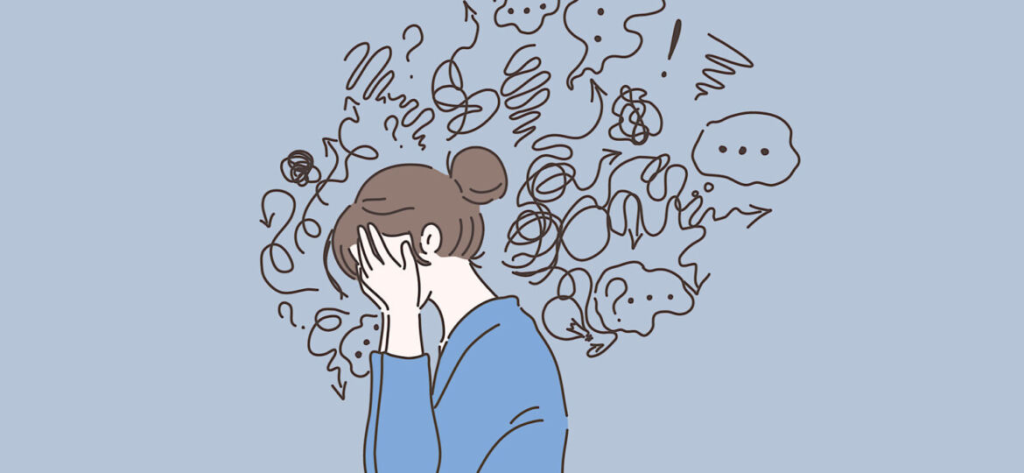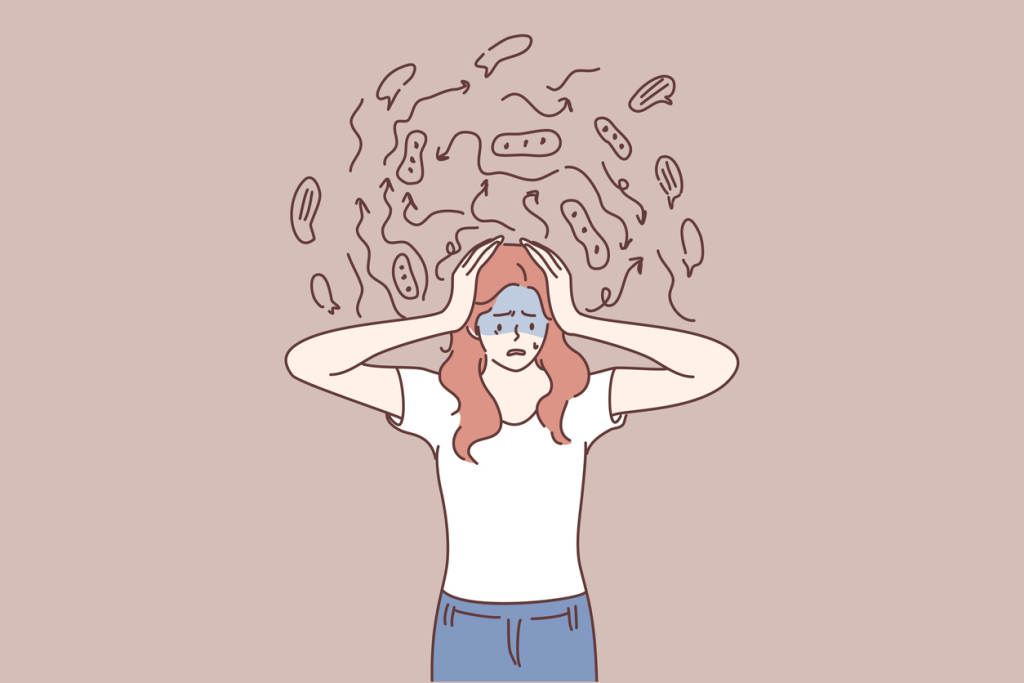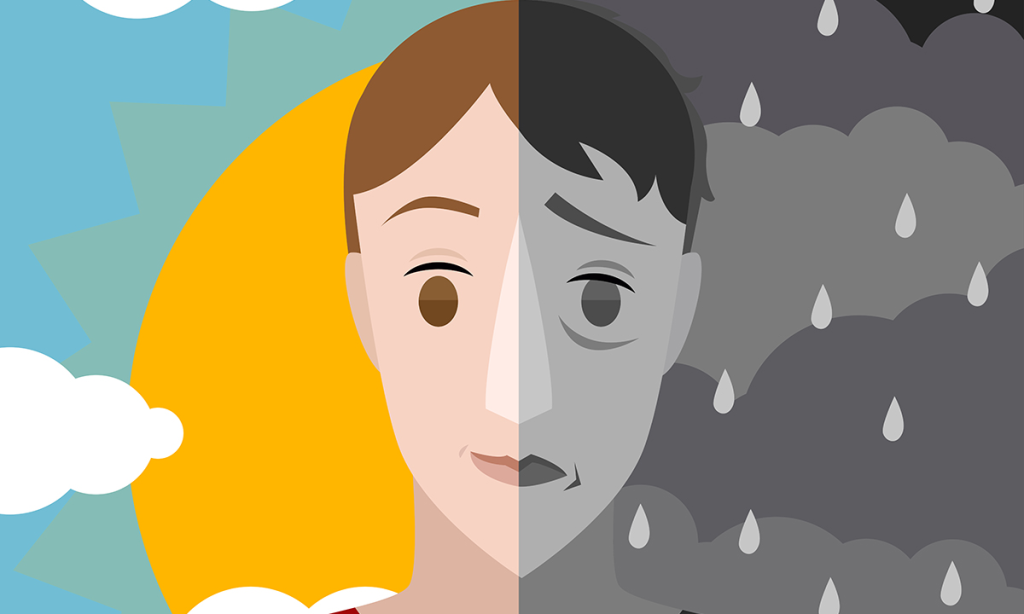
In the dynamic realm of academia, where knowledge flourishes and aspirations take flight, students embark on a transformative journey of self-discovery and personal growth. However, beneath the veneer of academic success and youthful zeal, a stark reality often goes unnoticed: the profound mental health challenges that many students grapple with on a daily basis. As we commemorate World Mental Health Day, this presents a timely opportunity to cast a spotlight on the pressing mental health issues besieging the student population.
From lecture halls to dormitories, these challenges pervade every corner of the educational landscape, impacting not only the learning experience but also the overall well-being of our youth. Through this blog, our aim is to explore these common mental health issues faced by students, striving to deepen our comprehension and ignite collective action to bolster their mental and emotional health.
Our blog seeks to shed light on the prevalent mental health issues that students encounter, offering invaluable insights and guidance to assist both students and their support networks in comprehending and effectively addressing these challenges. By fostering awareness, we aspire to cultivate a more supportive and empathetic environment that nurtures the well-being of young minds. Within this blog post, we will delve into some of the prevailing mental health issues confronted by students and provide valuable insights into coping strategies and methods to surmount these obstacles.
Academic Pressure and Stress

One of the most prevalent mental health challenges among students is the overwhelming academic pressure and stress they experience. The relentless pursuit of academic success coupled with high expectations from others often leads to immense stress and anxiety. Students constantly face the pressure to excel academically, meet demanding standards, and secure a prosperous future. This pressure can take a toll on their mental health, causing increased levels of stress, anxiety, and even burnout. The fear of failure, overwhelming workloads, tight deadlines, and difficulties in managing time can further exacerbate these issues.
Ways to cope with academic pressure:
- Prioritize tasks: Identify and focus on the most important tasks to reduce overwhelm. Break down larger assignments into smaller, manageable tasks to create a sense of progress and accomplishment.
- Seek support: Don’t hesitate to reach out for help when needed. Seek guidance from teachers, classmates, or academic support services to gain clarity and alleviate academic burdens.
- Practice time management: Develop effective time management skills to allocate sufficient time for different tasks. Create a schedule or to-do list to stay organized and avoid last-minute cramming.
- Practice self-care: Take care of your physical and mental well-being. Engage in activities that bring joy and relaxation, such as hobbies, exercise, or spending time with loved ones. Set realistic goals and avoid overworking yourself.
- Utilize relaxation techniques: Incorporate relaxation techniques like deep breathing exercises, meditation, or mindfulness into your routine. These practices can calm the mind, reduce stress levels, and improve focus.
- Develop healthy coping mechanisms: Find healthy ways to cope with stress and anxiety. Talk to trusted friends, family, or mentors about your challenges. Consider journaling to express your thoughts and emotions. Engage in activities that provide emotional outlets, such as art, music, or sports.
- Maintain a balanced lifestyle: Strive for a balance between academics and other aspects of life. Ensure you get enough sleep, eat nutritious meals, and engage in leisure activities to recharge and rejuvenate.
Anxiety

Anxiety is a prevalent mental health concern among students that can significantly impact their well-being and academic performance. The pressures of academic expectations, social dynamics, and personal challenges can contribute to heightened levels of anxiety. Students may experience persistent worry, fear, and restlessness, making it difficult to concentrate and engage fully in their studies. Physical symptoms such as rapid heartbeat, difficulty breathing, and stomach discomfort can further exacerbate their anxiety. It is important for students to recognize the signs of anxiety and seek appropriate support. Counseling, therapy, and self-care practices can help students manage their anxiety and develop healthy coping mechanisms. By fostering a supportive and understanding environment, educational institutions can play a crucial role in promoting mental well-being and providing resources for students to effectively address their anxiety.
Strategies to manage and alleviate anxiety:
- Recognize and acknowledge anxiety: Acknowledge that you are experiencing anxiety and understand that it is a common human response to stress. Recognizing your anxiety allows you to take steps toward managing it effectively.
- Practice deep breathing and relaxation techniques: Deep breathing exercises can help calm your body and mind during anxious moments. Engaging in relaxation techniques like progressive muscle relaxation or guided imagery can also promote a sense of calmness and reduce anxiety.
- Challenge negative thoughts: Identify and challenge negative thoughts that contribute to anxiety. Replace them with more realistic and positive thoughts. Practice reframing negative thinking patterns to cultivate a more balanced perspective.
- Maintain a balanced lifestyle: Establish a routine that includes regular exercise, healthy eating, and sufficient sleep. Physical activity releases endorphins and helps reduce stress and anxiety. A balanced diet and adequate sleep contribute to overall well-being and resilience.
- Practice mindfulness: Engage in mindfulness exercises or meditation to bring awareness to the present moment and cultivate a sense of calm. Mindfulness helps redirect attention away from anxious thoughts and promotes relaxation.
- Utilize resources and support services: Take advantage of resources provided by your educational institution, such as counseling services, support groups, or workshops focused on anxiety management. These resources can offer guidance and strategies tailored to students’ needs.
Panic Disorders

Panic disorders are a specific form of anxiety disorder that can greatly impact the lives of students. Students with panic disorder experience recurrent and unexpected panic attacks characterized by intense fear and discomfort. These panic attacks often come on suddenly and can be accompanied by physical symptoms such as heart palpitations, shortness of breath, chest pain, dizziness, and a sense of impending doom. It may lead to avoidance behaviors, such as avoiding places or situations where panic attacks have occurred in the past. Students with panic disorder may feel isolated and misunderstood, as these intense episodes can be difficult for others to comprehend. Seeking professional help, such as therapy and medication, can be effective in managing panic disorder. Developing coping mechanisms, practicing relaxation techniques, and building a support system are also crucial steps for students to navigate their education while living with panic disorder.
Strategies to manage and alleviate symptoms:
- Seek professional help: Consult with a mental health professional who specializes in anxiety disorders. They can provide an accurate diagnosis, offer personalized treatment plans, and guide you through therapeutic techniques to manage panic disorder effectively.
- Educate yourself: Learn about panic disorder to better understand its symptoms, triggers, and coping strategies. Knowledge empowers you to identify and address panic symptoms as they arise.
- Practice relaxation techniques: Deep breathing exercises, progressive muscle relaxation, and mindfulness meditation can help calm the body and mind during panic attacks. These techniques promote relaxation and help regulate breathing, reducing the intensity of panic symptoms.
- Create a support system: Seek support from friends, family, or support groups who can offer understanding and encouragement. Connecting with individuals who have similar experiences can provide validation and valuable coping strategies.
- Gradual exposure: Gradually face feared situations or triggers associated with panic attacks. Through exposure therapy, you can desensitize yourself to these situations over time, reducing anxiety and fear responses.
- Take care of your physical health: Engage in regular exercise, eat a balanced diet, and ensure adequate sleep. Physical well-being plays a crucial role in managing anxiety and promoting overall resilience.
- Plan ahead: Plan for challenging situations, such as exams or presentations, by breaking tasks into smaller, manageable steps. Developing effective time management and organizational skills can reduce stress and prevent panic triggers.
Depression and Mood Disorders

Depression and mood disorders are significant mental health challenges that affect many students. These disorders can have a profound impact on students’ emotional well-being, academic performance, and overall quality of life. Students with depression may experience persistent feelings of sadness, hopelessness, and a loss of interest in activities they once enjoyed. They may also exhibit changes in appetite, sleep patterns, and energy levels. Mood disorders, such as bipolar disorder, can involve extreme mood swings ranging from depressive episodes to periods of elevated or manic mood. The academic environment, social pressures, relationship challenges, and personal transitions can contribute to the development or exacerbation of depression and mood disorders among students. High levels of stress, perfectionism, isolation, and a lack of social support can further contribute to the prevalence of these disorders.
Strategies to cope with depression and mood disorders:
- Seek professional help: Consult with a mental health professional, such as a therapist or psychiatrist, who specializes in treating depression and mood disorders. They can provide a comprehensive assessment, offer appropriate treatment options, and guide you through therapy or medication management.
- Build a support system: Reach out to trusted friends, family members, or support groups who can provide understanding, empathy, and a listening ear. Sharing your experiences and feelings with others who have similar challenges can provide valuable support and encouragement.
- Engage in therapy: Participate in individual therapy, group therapy, or counseling sessions that focus on managing depression and mood disorders. Therapy can provide tools and coping strategies to navigate difficult emotions, develop healthier thought patterns, and improve overall well-being.
- Develop a routine: Establishing a structured daily routine can provide stability and a sense of purpose. Set realistic goals and break them down into manageable tasks. A routine can help create a sense of accomplishment and maintain a sense of control over your life.
- Challenge negative thoughts: Identify negative thought patterns and actively challenge them. Replace negative self-talk with more positive and realistic affirmations. Cognitive-behavioral techniques, such as reframing negative thoughts, can help shift your mindset and improve your overall outlook.
- Practice stress management: Learn and implement stress management techniques that work for you. This may include deep breathing exercises, progressive muscle relaxation, journaling, or engaging in mindfulness practices. Finding healthy outlets to manage stress can help alleviate symptoms of depression and mood disorders.
- Avoid isolation: Stay connected with others and maintain healthy relationships. Engage in social activities, join clubs or organizations, and participate in community events. Isolation can exacerbate feelings of depression, so reaching out and connecting with others is important.
Eating Disorders and Body Image Issues

Eating disorders and body image issues are significant concerns affecting many students. These conditions can have severe physical, emotional, and psychological consequences. Students with eating disorders, such as anorexia nervosa, bulimia nervosa, or binge eating disorder, may have an unhealthy preoccupation with food, weight, and body shape, leading to disordered eating patterns.
Body image issues, often intertwined with eating disorders, involve a distorted perception of one’s appearance, leading to dissatisfaction and negative self-esteem. Societal pressures, media influences, and comparisons to unrealistic beauty standards can contribute to the development and exacerbation of eating disorders and body image concerns among students. To address eating disorders and body image issues, it is essential to foster a supportive and inclusive environment within educational institutions.
Strategies to cope with eating disorders and body image issues:
- Seek professional help: If you suspect you have an eating disorder or struggle with body image issues, it is crucial to seek help from healthcare professionals who specialize in eating disorders. They can provide appropriate assessments, therapy, and nutritional guidance to support your recovery.
- Challenge unrealistic beauty standards: Recognize that beauty comes in diverse shapes, sizes, and forms. Challenge societal expectations and media messages that perpetuate unrealistic ideals. Surround yourself with positive body image influences, such as body-positive role models and inclusive media content.
- Cultivate a healthy relationship with food: Focus on nourishing your body with balanced meals and snacks. Avoid restrictive or fad diets that can contribute to disordered eating patterns. Seek guidance from a registered dietitian who can help create a healthy and sustainable meal plan.
- Practice self-acceptance and self-compassion: Embrace and accept your body as it is, recognizing that self-worth is not solely determined by appearance. Practice self-compassion by being kind and forgiving to yourself, challenging negative self-talk, and celebrating your unique qualities and accomplishments.
- Engage in body-positive activities: Participate in activities that promote body acceptance, such as yoga, dance, or other forms of movement that focus on body positivity and self-expression rather than appearance. Find joy in activities that celebrate your body’s capabilities and strength.
- Seek counseling or therapy: Consider participating in individual or group therapy sessions focused on body image and eating disorders. Therapy can provide a safe space to explore underlying emotional issues, develop coping strategies, and promote self-acceptance.
- Engage in body-positive advocacy: Get involved in campaigns or initiatives that promote body positivity and raise awareness about eating disorders and body image issues. Advocacy can contribute to broader societal changes and help support others going through similar struggles.
Loneliness and Social Isolation

Loneliness and social isolation are significant challenges that many students face, particularly in today’s fast-paced and digitally-driven world. The feeling of loneliness, a subjective sense of being alone or lacking meaningful connections, can have a profound impact on students’ mental and emotional well-being. Social isolation, on the other hand, refers to a lack of social interactions and a limited support network. To address loneliness and social isolation, it is important for students to take proactive steps in building connections and fostering a sense of belonging.
Strategies to cope with social isolation and loneliness:
- Seek out social opportunities: Actively engage in social activities, clubs, organizations, or extracurricular events that align with your interests. These provide opportunities to meet like-minded individuals and form new connections.
- Utilize technology wisely: While excessive use of technology can contribute to feelings of isolation, it can also be a valuable tool for connecting with others. Engage in online communities, forums, or social media groups related to your interests or academic pursuits. However, it is essential to balance virtual interactions with real-life connections.
- Be open-minded and inclusive: Approach social interactions with an open mind and a willingness to connect with diverse individuals. Embrace opportunities to learn from others’ experiences and perspectives. Foster an inclusive and welcoming attitude that encourages others to feel comfortable around you.
- Strengthen existing relationships: Cultivate and nurture existing friendships and relationships. Make an effort to connect with friends, classmates, or roommates by planning activities together, engaging in meaningful conversations, or simply spending time together.
- Practice effective communication: Develop effective communication skills that allow you to express your thoughts, emotions, and needs to others. Be an active listener, show genuine interest in others, and initiate conversations to build deeper connections.
- Take initiative: Don’t wait for others to reach out to you. Take the initiative to invite people to socialize, attend events, or collaborate on projects. By being proactive, you increase the likelihood of forming new connections.
- Seek support from counseling services: If feelings of loneliness persist or become overwhelming, consider seeking support from counseling services offered by your educational institution. Professional counselors can provide guidance, support, and strategies to address loneliness and social isolation.
Substance Abuse and Addiction

Substance abuse and addiction are serious issues that can profoundly impact the lives of students. The misuse of drugs or alcohol can lead to a range of physical, mental, and social problems, interfering with academic performance, relationships, and overall well-being. Substance abuse among students may stem from various factors, including peer pressure, stress, experimentation, or self-medication for underlying mental health issues. Coping with substance abuse and addiction requires a multifaceted approach that involves professional help, support systems, and personal commitment.
Strategies to cope with substance abuse and addiction:
- Seek professional help: Reach out to healthcare professionals, counselors, or addiction specialists who can provide appropriate assessments, treatment options, and guidance. They can help develop a personalized plan for recovery and provide resources for ongoing support.
- Build a support network: Surround yourself with a strong support system of family, friends, and support groups who understand and support your journey to recovery. Joining recovery groups or attending support meetings, such as Alcoholics Anonymous (AA) or Narcotics Anonymous (NA), can provide a sense of community and understanding.
- Develop healthy coping mechanisms: Identify healthier ways to cope with stress, emotions, and triggers that may lead to substance abuse. Explore alternative activities such as exercise, mindfulness, creative outlets, or hobbies that promote relaxation, self-expression, and overall well-being.
- Develop healthy routines: Establish a structured routine that incorporates healthy habits and activities. This includes setting regular sleep schedules, dedicating time for self-care, and engaging in productive and fulfilling activities that support your goals and well-being.
- Address underlying issues: Substance abuse is often linked to underlying mental health issues such as anxiety, depression, or trauma. Seek professional help to address and manage these issues effectively, as they may contribute to the cycle of substance abuse.
- Practice relapse prevention strategies: Identify triggers and develop strategies to avoid or manage them. Create a relapse prevention plan that includes coping mechanisms, support systems, and emergency contacts to prevent or respond to potential relapses.
- Take it one day at a time: Recovery is a journey, and it takes time and perseverance. Focus on each day and celebrate small victories. Acknowledge that setbacks may occur, but they are opportunities for learning and growth. Stay committed to your recovery and seek help when needed.
Sleep Disorders

Sleep disorders can significantly impact the well-being and academic performance of students. Common sleep disorders among students include insomnia, sleep apnea, restless legs syndrome, and narcolepsy. These disorders can result from various factors such as stress, irregular sleep schedules, excessive technology use, or underlying medical conditions. Coping with sleep disorders requires implementing healthy sleep habits and seeking appropriate professional help.
Strategies to cope with sleep disorders:
- Establish a consistent sleep routine: Set a regular sleep schedule by going to bed and waking up at the same time every day, including weekends. This helps regulate your body’s internal clock and promotes better sleep quality.
- Create a sleep-friendly environment: Make your sleep environment conducive to restful sleep. Ensure your bedroom is cool, dark, and quiet. Use comfortable bedding and invest in a supportive mattress and pillows. Limit exposure to electronic devices before bedtime to avoid the stimulating effects of blue light.
- Practice good sleep hygiene: Adopt healthy habits to improve sleep quality. Avoid consuming caffeine or heavy meals close to bedtime. Engage in relaxing activities before bed, such as reading, listening to calming music, or taking a warm bath. Establish a wind-down routine to signal to your body that it’s time to sleep.
- Limit daytime napping: If you have trouble sleeping at night, limit daytime napping or keep it to short power naps early in the day. Prolonged or late-day napping can disrupt your nighttime sleep patterns.
- Create a bedtime ritual: Establish a calming routine before bed to signal your body and mind that it’s time to unwind. This can include activities like reading a book, practicing gentle stretching or yoga, or listening to soothing music.
- Seek professional help: If your sleep disorder persists or significantly affects your daily life, consider consulting a healthcare professional specializing in sleep medicine. They can conduct evaluations, provide a diagnosis, and recommend appropriate treatments or therapies tailored to your specific sleep disorder.
Mental Health Resources
We’ve curated a few vital online resources and helpline numbers that can be invaluable if you require assistance with your mental health:
- Mental Health – SupportGoWhere (Singapore) – Help is available if you need to speak to someone today, call the SOS hotline at 1-767 (24 hours every day).
- Other Mental Health Resources (Singapore) – CHAT
- Samaritans of Singapore (SOS) (1800-221-4444)
- Silver Ribbon Singapore (6385-3714)
- National Care Hotline (Singapore): 1800-202-6868 (8 am-12 am daily)
- Institute of Mental Health’s Mental Health Helpline (Singapore) (6389-2222)
- Parivarthan (India)– Helpline: +91-7676602602, Time: 1:00 PM – 10:00 PM | Monday to Friday, Languages: All Indian languages except తెలుగు, മലയാളി.
- Sangath (India)- Helpline: 011-41198666, Time: 10 AM -6 PM, Languages: English, हिंदी, मराठी, कोंकणी, Email: contactus@sangath.in
- Mental Health America (US)- Call or text 988 or chat at 988lifeline.org. You can also reach the Crisis Text Line by texting MHA to 741741. You can also call 1-800-985-5990 or text “TalkWithUs” to 66746 at the SAMHSA Disaster Distress Helpline. Trained crisis workers will listen to you and direct you to the resources you need.
- Directory of International Mental Health Helplines– Worldwide
Conclusion
In conclusion, as we commemorate World Mental Health Day, it is evident that students today confront a spectrum of mental health challenges, encompassing academic pressure, stress, anxiety, depression, body image issues, loneliness, substance abuse, and sleep disorders. Recognizing the impact of mental health on academic performance and personal growth is crucial. Educational institutions, families, and society must actively promote mental well-being by offering support services, reducing stigma, and fostering inclusive communities. By raising awareness and understanding, we can empower students to thrive academically, personally, and emotionally.
Remember to be kind to yourself and prioritize your well-being. Seek professional help if academic pressure and stress become overwhelming. Coping with mental health issues is a personal journey; try different strategies, seek support, and prioritize self-care. You are not alone, and there is hope for a brighter future. Together, let’s prioritize mental health.





